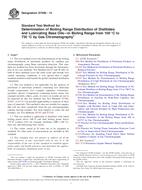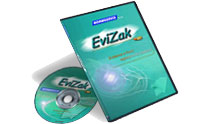Wir benötigen Ihre Einwilligung zur Verwendung der einzelnen Daten, damit Sie unter anderem Informationen zu Ihren Interessen einsehen können. Klicken Sie auf "OK", um Ihre Zustimmung zu erteilen.
ASTM D7500-14
Standard Test Method for Determination of Boiling Range Distribution of Distillates and Lubricating Base Oils—in Boiling Range from 100 °C to 735 °C by Gas Chromatography
Automatische name übersetzung:
Standard Test Methode zur Bestimmung der Siedebereichsverteilung der Destillate und Schmierölen & mdash; im Siedebereich von 100 & thinsp; ° C bis 735 & thinsp; ° C mittels Gaschromatographie
NORM herausgegeben am 1.10.2014
Informationen über die Norm:
Bezeichnung normen: ASTM D7500-14
Anmerkung: UNGÜLTIG
Ausgabedatum normen: 1.10.2014
SKU: NS-38620
Zahl der Seiten: 19
Gewicht ca.: 57 g (0.13 Pfund)
Land: Amerikanische technische Norm
Kategorie: Technische Normen ASTM
Die Annotation des Normtextes ASTM D7500-14 :
Keywords:
boiling range distribution, capillary gas chromatography, distillates, flame ionization detection, lubricating base oils, petroleum products, simulated distillation,, ICS Number Code 75.100 (Lubricants, industrial oils and related products)
Ergänzende Informationen
| Significance and Use | ||||||||||||||||||||||||
|
5.1 The boiling range distribution of medium and heavy petroleum distillate fractions provides an insight into the composition of feed stocks and products related to petroleum refining processes (for example, hydrocracking, hydrotreating, visbreaking, or deasphalting). The gas chromatographic simulation of this determination can be used to replace conventional distillation methods for control of refining operations. This test method can be used for product specification testing with the mutual agreement of interested parties. 5.2 This test method extends the scope of boiling range determination by gas chromatography to include distillates (IBP > 100 °C) and heavy petroleum distillate fractions beyond the scope of Test Method D2887 (538 °C). 5.3 Boiling range distributions obtained by this test method have not been analyzed for correlation to those obtained by low efficiency distillation, such as with Test Method D86 or D1160. This test method does not claim agreement between these physical distillations and simulated distillation. Efforts to resolve this question will continue. When successful resolutions of the questions are determined, this test method will be revised accordingly. |
||||||||||||||||||||||||
| 1. Scope | ||||||||||||||||||||||||
|
1.1 This test method covers the determination of the boiling range distribution of petroleum products by capillary gas chromatography using flame ionization detection. This standard test method has been developed through the harmonization of two test methods, Test Method D6352 and IP 480. As both of these methods cover the same scope and include very similar operating conditions, it was agreed that a single standard method would benefit the global simulated distillation community. 1.2 This test method is not applicable for the analysis of petroleum or petroleum products containing low molecular weight components (for example naphthas, reformates, gasolines, diesel). Components containing hetero atoms (for example alcohols, ethers, acids, or esters) or residue are not to be analyzed by this test method. See Test Methods D7096, D2887, or D7213 for possible applicability to analysis of these types of materials. This method is also not suitable for samples that will not elute completely from the gas chromatographic column, leaving residues. For such samples as crude oils and residues, see Test Methods D5307 and D7169. 1.3 This test method is applicable to distillates with initial boiling points above 100 ºC and final boiling points below 735 ºC (carbon 110); for example, distillates (IBP > 100 °C), base oils and lubricating base stocks. 1.4 The values stated in SI units are to be regarded as standard. No other units of measurement are included in this standard. 1.5 This standard does not purport to address all of the safety concerns, if any, associated with its use. It is the responsibility of the user of this standard to establish appropriate safety and health practices and determine the applicability of regulatory limitations prior to use. |
||||||||||||||||||||||||
| 2. Referenced Documents | ||||||||||||||||||||||||
|
Empfehlungen:
EEviZak – alle Gesetze einschließlich ihrer Evidenz in einer Stelle
Bereitstellung von aktuellen Informationen über legislative Vorschriften in der Sammlung der Gesetze bis zum Jahr 1945.
Aktualisierung 2x pro Monat!
Brauchen Sie mehr Informationen? Sehen Sie sich diese Seite an.




 Cookies
Cookies
